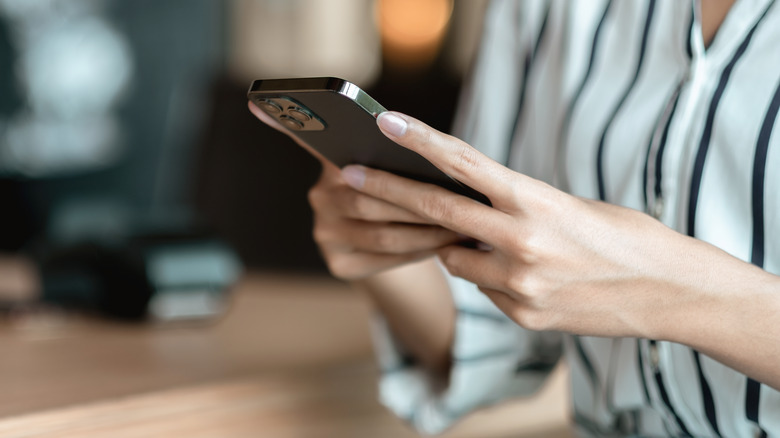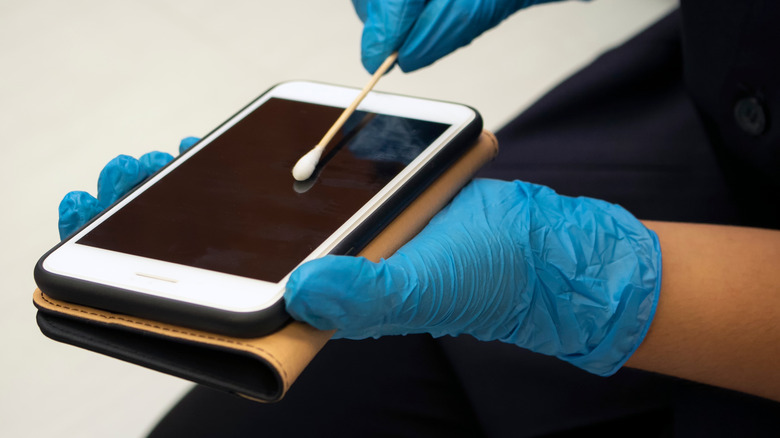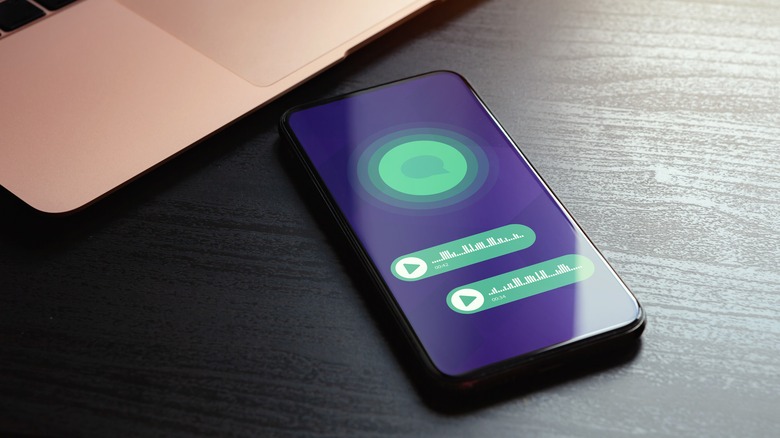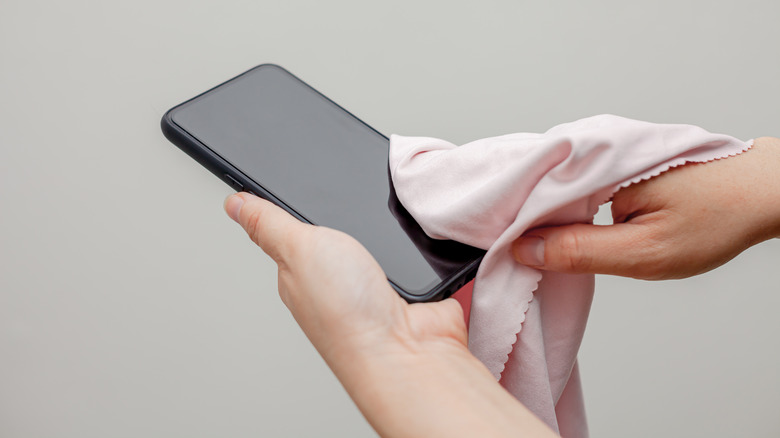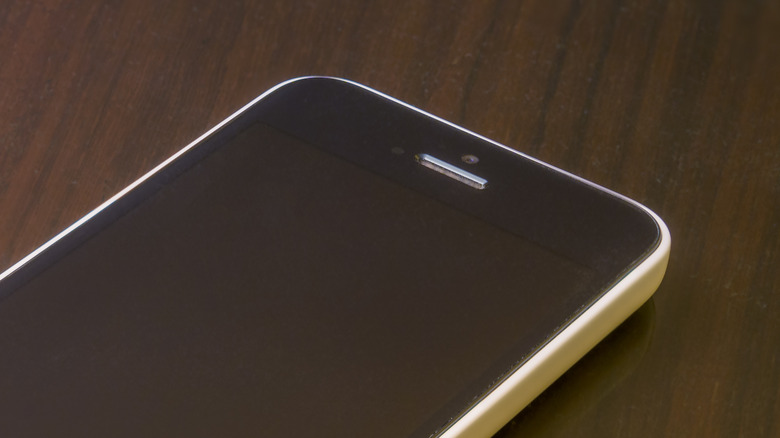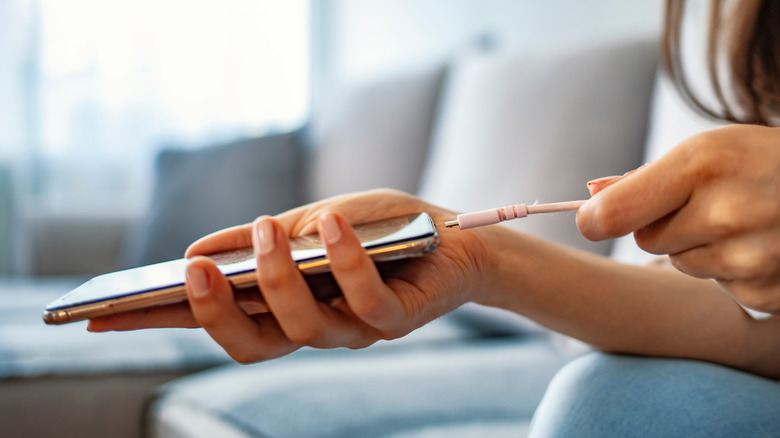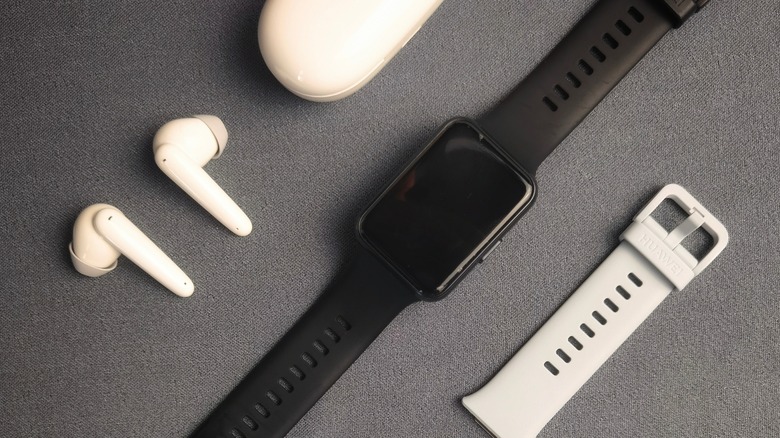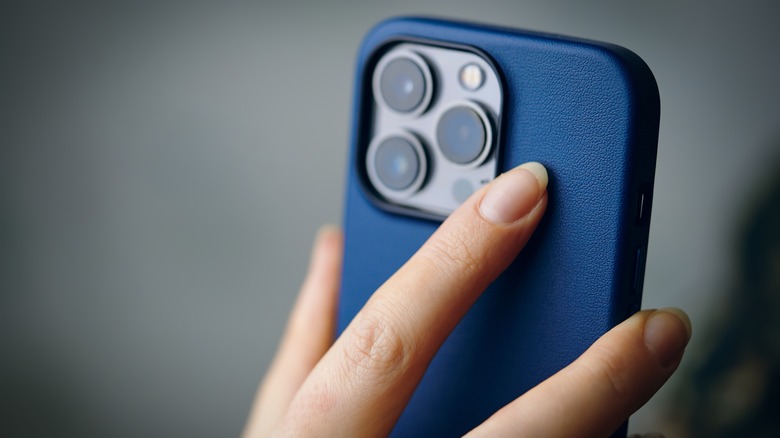How To Properly Clean Your Cell Phone
In the modern world, many people view their cell phones as an extension of themselves. As Pew Research reports, 97 percent of adults own a cell phone and 85 percent of those have smartphones. This reliance on cell phones has sprung from their many benefits. They have become the primary way to stay in touch with friends and family. Cell phones also make working on the go possible and give parents a way to keep track of their kids. With constantly-evolving capabilities, smartphones are becoming powerhouses of function and convenience.
These phone users pick up their phones an astounding 96 times a day (via Asurion). This means that germs and bacteria are likely to build up throughout the day. Plus, as they tag along with users wherever they go, cell phones can pick up dust and debris along the way. All of this makes cleaning your cell phone a super important chore. It's important to get into a good cleaning routine to prevent wear and tear and reduce germs. Plus, it's essential to use the correct method for cleaning your phone and its various parts to ensure it's kept in good shape long term.
Why it's so important to keep your cell phone clean
One huge part of keeping your cell phone clean is reducing the number of germs on its surface. A study published by the National Library of Medicine found that some users' phones contained over 17,000 bacterial gene copies. The study also hypothesized that the germs carried on phones can play a role in the spread of contagious diseases. This makes cleaning your phone as much a part of staying healthy as washing your hands. Cleaning product manager Adriana Catinari tells Reader's Digest, "Your phone is exposed to everything you touch. What's on your hands is on your phone. Healthcare experts stress that washing your hands frequently with soap and water is the best defense against the spread of germs that cause sicknesses and viruses to spread."
Keep in mind that phones that are used frequently are typically warm to the touch. This is a prime environment for germs to thrive. Phones also have tons of tight spots that can be tough to clean thoroughly. UV lights can kill germs on the surface of phones; however, a special cleaning kit might be your best bet. Catinari describes these cleaning kits as "the best way to 'wash' your phone, ultimately, stopping the spread of germs that grow on the dirt that accumulates on your phone."
Another reason to keep your phone clean is to maintain clean skin. Every time you hold your phone up to your face, you come in contact with whatever dirt or germs are lurking on the surface. Dermatologist Joshua Zeichner, M.D. tells Sunday Edit, "Holding a dirty phone up to your face can cause friction, inflammation and promote acne breakouts," adding that "it may be caused by the occlusion of the oil glands from dirt and oil on the surface of the phone itself." For this reason, he recommends regularly cleaning your phone to keep acne at bay.
A clean phone is a more functional phone
If you find that your phone isn't functioning up to par, it might be time for a good cleaning. If callers can hear you clearly, MakeUseOf points out that it could be due to a dirty microphone. Dust and debris can obscure the mic and cause your voice to sound distorted. If the sound on your end is muffled, it might be due to trying to listen through a dirty speaker (via WikiHow). Keep your phone clean to ensure all of your calls and consistently crisp and clear.
Worse than temporary performance issues, build-up dust can cause permanent damage to your phone (via Burga). Abrasive dust particles can scratch your phone's glass and cause screen issues. It can also make its way into charging ports and prevent them from functioning properly. The most detrimental issue is dust finding its way inside your phone and building up around the battery. This can cause overheating and irreversible damage to your phone, rendering it useless.
How often should you clean your phone?
How often you should clean your phone depends on your behavior and habits. Many people use their phones while eating. As Time points out, even if you wash your hands before sitting down, picking your phone up mid-meal can transfer the surface's germs back to your clean hands. If you use your phone constantly, including during mealtimes, more frequent disinfecting is a good idea. New York University medical professor tells the publication, "I clean mine twice a day, once in the morning and once in the evening."
Using a rubber case might warrant extra cleaning as well. The soft surface of the case can be easier for germs to adhere to than the smooth surface of the phone itself. Plus, cases often have more divots and ridges for sneaky germs to hide.
Keeping your phone cleaner in the first place can make frequent cleaning less necessary. Nearly half of Americans have used their phones in a public restroom and even more have set their phones on a public dining table or bar (via Asurion). Adopt behaviors to help your phone avoid germy spots. Keep your phone in your pocket or purse when out in public and wash or sanitize your hands before using it. Instead of holding your phone up to your face to talk in public, keep it put away and use a hands-free option like earbuds.
How to clean your phone's screen
Cleaning your phone's screen is important for both visibility and functionality. To keep your screen clean, you should regularly clean the surface following the proper steps. According to Case-Mate, you should reference your manufacturer's instructions before getting started. Not following their directions could damage your device or void the warranty. Then, power your phone down, unplug it, and remove your protective case. Use a high-quality microfiber cloth that's slightly damp to wipe the screen from top to bottom taking care to not get moisture in any ports. If you would like to disinfect the screen, gently use a wipe containing 70 percent isopropyl alcohol. Avoid any harsh cleaning products that could damage the surface of your screen.
If you're one of the many phone users that have a protective screen cover, you might need to remove it for cleaning as well. If you want to take it off for a full deep clean or if debris has made its way under it, you can clean the back of your screen protector as well (via Gazelle). To remove any particles from the sticky side of the screen protector, simply rinse it under cold water. A few drops of dish soap can be used to remove any stubborn debris. Then, allow it to dry completely before re-adhering it to your phone screen.
Cleaning your cell phone speakers
Keeping your phone's speakers clean is key to their performance. If you find that the sound of your calls or notifications is muffled, it's time for a good cleaning. To thoroughly clean your speakers, Mashable recommends using a clean and dry soft-bristled brush like a toothbrush. Gently wipe dirt and debris away at an angle to avoid pushing it further in. You can also purchase a specialized cleaning putty to remove more stubborn or stuck-on dirt.
When cleaning your phone's speakers, you should never use sharp or metal objects that can harm the grills. It's also important not to use anything damp like rubbing alcohol that could seep in and damage internal parts. Canned air that's useful in getting crumbs out of computer keyboards is too harsh for your phone's components and should also be avoided. Handheld blowers are a good alternative that have less force but offer the same cleaning concept.
How to clean your phone's ports
Your phone's ports also require regular cleaning for prime functionality. Review Geek points out that these ports are delicate and can be severely impacted by dust and debris. This can slow down charging or even cause permanent damage to charging components. If you feel something inside the port when you're plugging it into the charging cord, clean it immediately. Otherwise, clean it as regularly as you clean your phone to keep it damage-free.
Inspect the inside of the port with a flashlight to look for any gunk and damage like bends and scratches. Then, use canned air to blow out any dust using short sprays. If you still have debris lodged in the port, use a plastic toothpick to loosen it and use the canned air to blow remove it. To keep your port cleaner in the future, purchase a case with an integrated port cover or use special port dust caps to keep debris out.
Cleaning your cell phone's accessories
In addition to cleaning your cell phone, you should also make sure to keep your accessories clean. If your charger isn't working as quickly as normal, it might need a good cleaning. WikiHow suggests dipping a Q-tip in 99 percent alcohol and gently rubbing the tip of the charger. You can also gently scrape away any stubborn dirt or debris with a wooden toothpick. Allow the charger to completely dry before plugging your phone in again.
You should also keep your earbuds clean for hygienic and performance reasons as well. Avoid using cleaners like wipes and alcohol that could void your warranty (via The Verge). You can blow debris out of your earbuds with a handheld blower or a can of compressed air. Never use your mouth because you could accidentally blow moisture into the tiny speaker grills. You can also use tools like clean Q-tips, toothpicks, or pipe cleaners to gently dislodge stubborn dirt and ear wax. Don't forget to give the inside of your charging case a good cleaning as well.
If you wear a smartwatch, it likely gets pretty dirty during daily use. Many are waterproof, making them simple to clean (via PC Mag). It's a good idea to clean your smartwatch daily, especially if you wear it all the time. To clean the screen, simply use a drop of dish soap and a microfiber cloth to wipe it and rinse it off. The band should be cleaned according to the manufacturer's instructions for the specific material. For silicone and most metal bands, you can use diluted dish soap and a toothbrush to brush it clean. Leather and gold bands should be handled with extra care and likely require special cleaners. For any hard-to-reach crevices, use a Q-tip and alcohol to wipe them clean.
Using a case to keep your phone cleaner
To keep your cell phone as clean as possible, invest in a high-quality case designed for your specific model. Experts tell Wired that users should avoid plastic cases. Instead, look for a tight-fitting silicone or rubber case that can absorb shock and keep dust and dirt out. If your phone isn't water resistant, look for a phone with moisture-proof properties. Make sure you regularly wipe down your case and all of its nooks and crannies to keep it clean as well.
If you work in an industry like construction or are buying a case for a young phone user, you might want to consider a rugged case option. This can make your phone bulky and heavier but could be worth the extra protection in harsh environments (via Digital Trends). These cases are rated on an IG, or Ingress Protection, scale. This indicates how resistant they are to dust and water. A higher rating will keep your phone cleaner and protect it better from damage.
